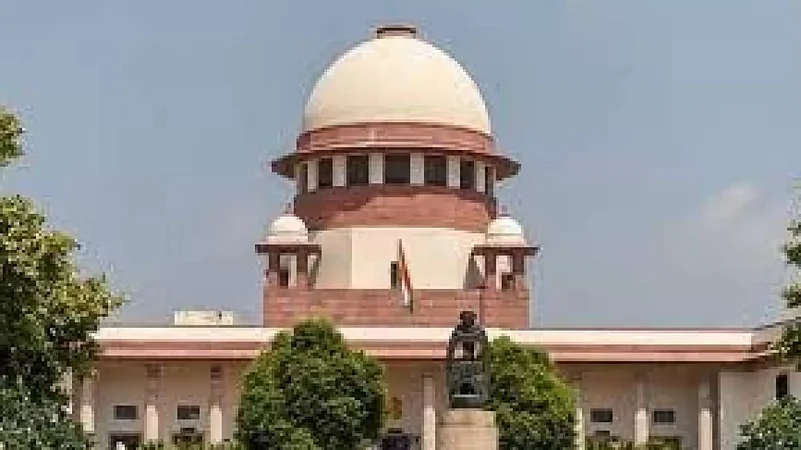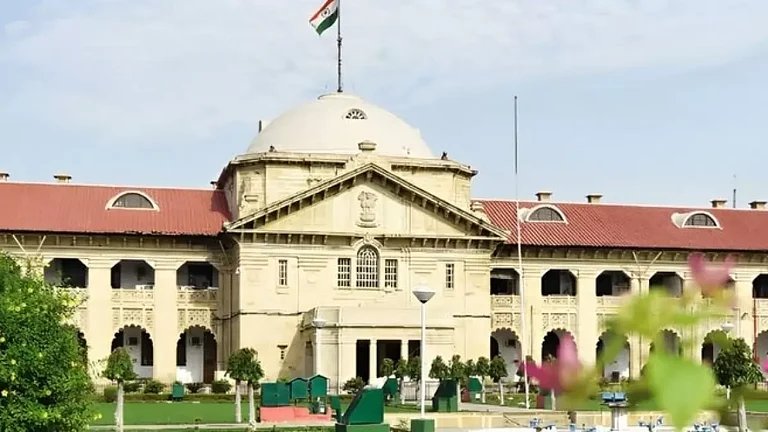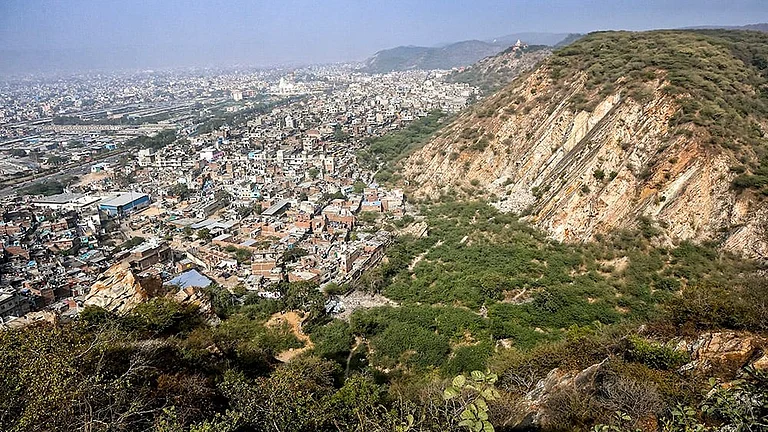In a far-reaching judgement, the Supreme Court on Monday overturned a 1998 judgement and ruled that lawmakers are not immune from prosecution for taking bribe for casting a vote or making a speech in the house.
Last year in September, the SC had agreed to reexamine the 'Jharkhand Mukti Morcha case' (1998) in which the SC had ruled in a 3:2 judgement that lawmakers had immunity against making a speech or casting a vote in the house. The SC set up a seven-judge Constitution Bench to reexamine the 1998 judgement.
In the unanimous judgement, the seven-judge Constitution Bench headed by Chief Justice of India (CJI) DY Chandrachud on Monday ruled that Articles 105 and 194 of the Constitution, which deal with the powers and privileges of lawmakers in the parliament and state or union territories' assemblies, seek to sustain an environment in which debate and deliberation can take place within the legislature, but these provisions do not render them immune from taking bribe, according to PTI.
In the 1998 judgement, the five-judge bench of the Supreme Court ruled that MPs and MLAs have total immunity in all matters related to voting in the house, which meant they were immune to prosecution even if they have taken bribe to cast a vote. Now, that judgement has been overturned.
Here we explain the case that led to the 1998 judgement, what legal and constitutional provisions are involved, and what the road ahead is expected to be.
What Was 1998 JMM Judgement?
In 1998, the Supreme Court delivered a judgement in the Jharkhand Mukti Morcha (JMM) bribery case.
The case was related to taking of bribe by five JMM MPs, including the party patriarch Shibu Soren, in 1993 to vote against the no-confidence motion faced by the Congress government led by Prime Minister PV Narasimha Rao. The Rao-led government, which was in minority in Lok Sabha, survived the motion. The CBI registered a case against five JMM MPs, which was quashed by a five-judge bench of the Supreme Court in 1998.
The Supreme Court ruled that, as par Article 105 (2) of the Constitution of India, the actions of the MPs related to a speech made or a vote cast in the hall are immune from any prosecution.
Article 105 (2) states, "No member of Parliament shall be liable to any proceedings in any court in respect of any thing said or any vote given by him in Parliament or any committee thereof, and no person shall be so liable in respect of the publication by or under the authority of either House of Parliament of any report, paper, votes or proceedings."
In the same case, however, Ajit Singh was convicted, notes SC Observer, as he had taken a bribe but had not cast a vote, which meant he did not have any immunity.
"In its 1998 judgment, the Supreme Court didn’t extend immunity under Article 105(2) to one of the accused – Ajit Singh. Unlike those who enjoyed immunity under Article 105(2), Singh never cast a vote. The Supreme Court reasoned that this prevented him from claiming protection under Article 105(2)," notes SC Observer.
Why Did Supreme Court Overturn 1998 JMM Verdict?
In the unanimous judgement, the seven-judge Constitution Bench of the Supreme Court on Monday overturned the 1998 JMM bribery case verdict of the SC's five-judge bench. The seven-judge bench was headed by CJI DY Chandrachud and comprised Justices AS Bopanna, MM Sundresh, PS Narasimha, JB Pardiwala, PV Sanjay Kumar, and Manoj Misra.
The crux of the Monday's judgement is that lawmakers do not hold immunity under Articles 105 and 194 of the Constitution for acts of bribery.
The Apex Court ruled that taking a bribe is an offence under the Prevention of Corruption Act (PoCA), 1988 and actions that follow taking of the bribe have no bearing on the application of immunity, according to the SC Observer.
The SC noted that the judgement applied to elections of legislatures, Rajya Sabha, President, and Vice President.
The report further cited the Apex Court as saying that the 1998 judgement had a "paradoxical outcome" which "results in a situation where a legislator is rewarded with immunity when they accept a bribe", but are prosecuted if they do not act according to the bribe. Reading the judgement, Chandrachud said that the bench concluded that the 1998 verdict had to be overruled.
Reading the judgement, Chandrachud also said that "corruption and bribery of members of the legislature erode the foundation of Indian parliamentary democracy" and could not be allowed.
In its 135-page verdict penned by Chandrachud, the Apex Court said: "It does not matter whether the vote is cast in the agreed direction or if the vote is cast at all. The offence of bribery is complete at the point in time when the legislator accepts the bribe."
The verdict further said that there was a "grave danger" if the 1998 judgement was not overruled.
"The judgment of the majority in PV Narasimha Rao (supra), which grants immunity from prosecution to a member of the legislature who has allegedly engaged in bribery for casting a vote or speaking has wide ramifications on public interest, probity in public life and parliamentary democracy. There is a grave danger of this court allowing an error to be perpetuated if the decision were not reconsidered," said the judgement.
The Apex Court further said that while the lawmakers had immunity to operate without fear in the house, the purpose to ensure free and process is defeat when bribe comes into the picture. The judgement said, "Members of the legislature and persons involved in the work of the committees of the legislature must be able to exercise their free will and conscience to enrich the functions of the House. This is exactly what is taken away when a member is induced to vote in a certain way not because of their belief or position on an issue but because of a bribe taken by the member."
Why Did the SC Re-Examine JMM Verdict?
Last year in September, the Supreme Court had decided to re-examine the JMM bribery case judgement while hearing an appeal in a case related to the taking of a bribe by an MLA in 2012 for vote in the Rajya Sabha elections.
Incidentally, the MLA in the 2012 bribery case is Sita Soren, an MLA from JMM at the time and daughter-in-law of Shibu Soren, who was involved in the earlier bribery case decided in 1998. She allegedly took bribe to vote for one candidate but voted for another.
A case was subsequently filed against Sita and the Jharkhand High Court in 2014 ruled that she is not immune from prosecution. She challenged the case in the Supreme Court and the matter came before a three-judge bench of the Supreme Court.
"The High Court interpreted this to mean that there must be a nexus between the bribe and the vote. It held that there was no nexus between the bribe [Sita] Soren received and the vote she cast. While Soren allegedly took a bribe to vote for candidate ‘X’, she ultimately voted for candidate ‘Y’. Drawing parallels to Ajit Singh, the High Court held she couldn’t claim immunity under Article 194(2), as the bribe she received did not influence her vote. Further, the allegations were made against her even before she voted," noted SC Observer at the time.
In 2019, a three-judge bench of the Supreme Court referred the matter to a five-judge bench. This is how the matter reached the five-judge Constitution Bench headed by CJI DY Chandrachud.
Then, in 2023, the Constitution Bench of the Supreme Court referred the case to a seven-judge bench that finally re-examined the case and overruled the 1998 order.
While agreeing to re-examine the 1998 order, the Apex Court said that this was an opportunity to "straighten the law". It further noted that the matter involved "morality of the polity".
"As a constitution bench, if we have a particular issue which deeply affects the morality of our polity, shouldn't we take an opportunity to straighten the law," said the bench at the time.









_570_850.jpg?auto=format%2Ccompress&fit=max&format=webp&w=768&dpr=1.0)
















